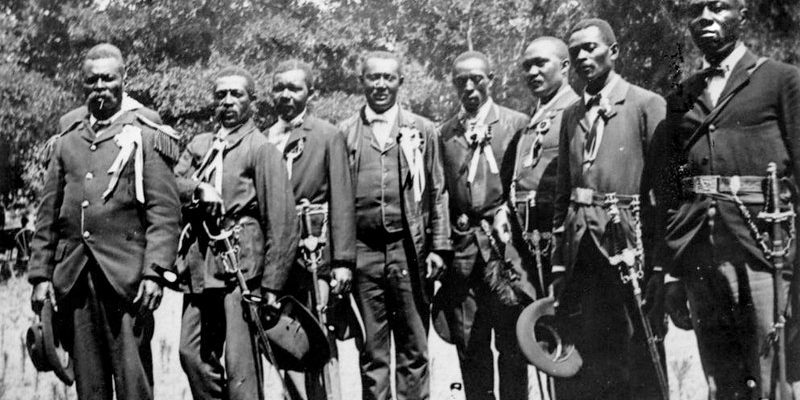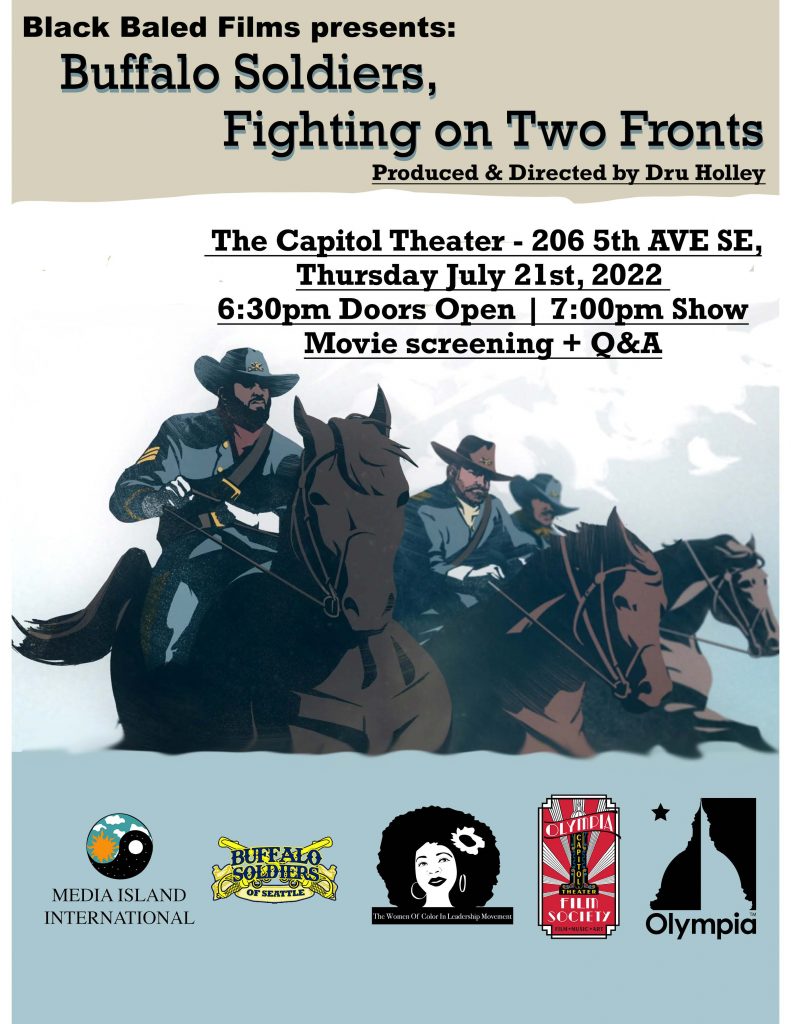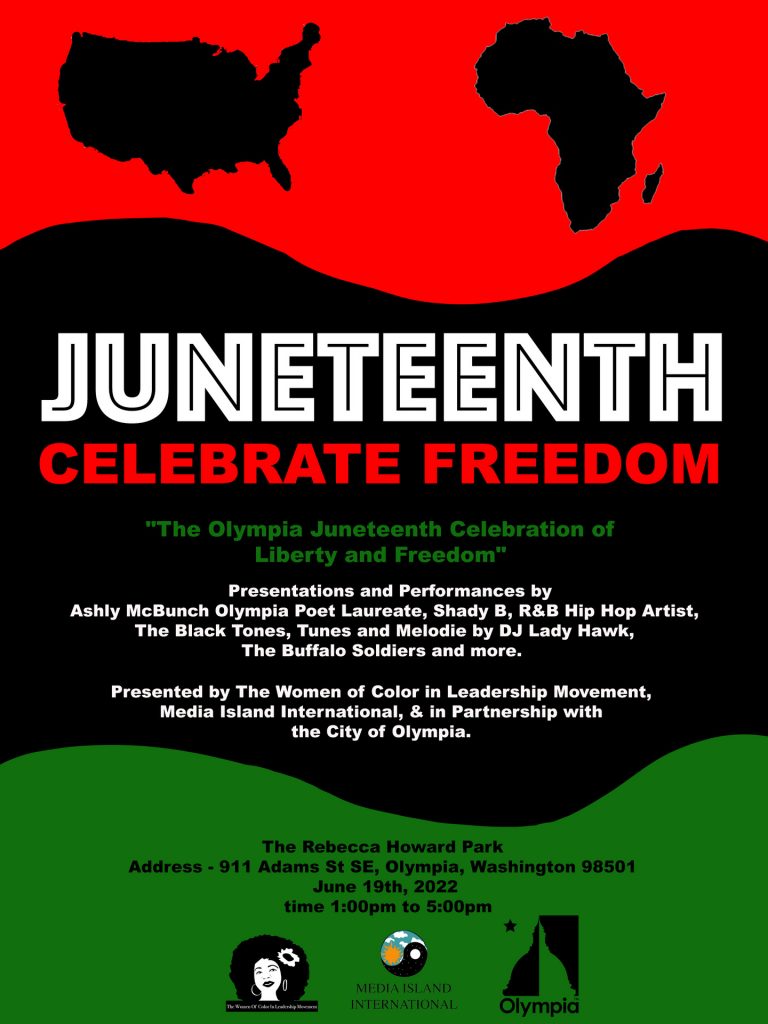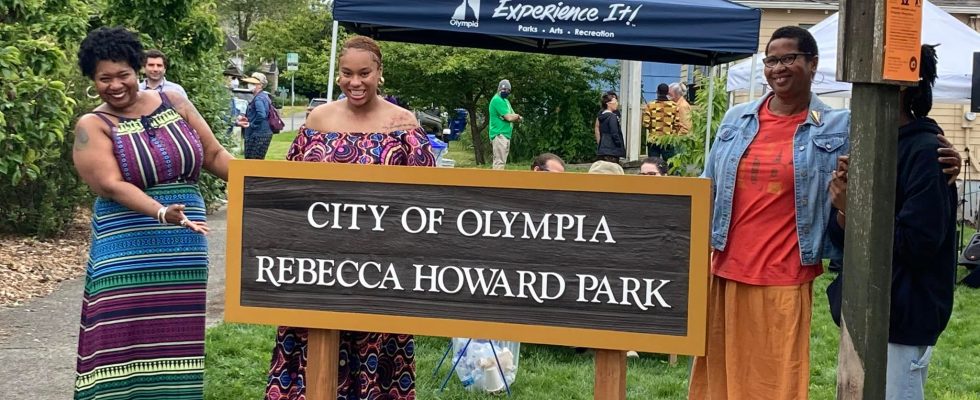
Shawna Hawk has a knack for building relationships. Back in her college days, she connected her academia colleagues with the local Olympia radio station when she joined KOWA. Now that KOWA is on hiatus, Hawk is still working with the organization that housed it, Media Island International. Hawk took some time to share the history behind the process of her latest collaborative projects: a city Juneteenth celebration and a documentary about Buffalo Soldiers.
The Biden administration made Juneteenth a federal holiday this year. What was the scene like for your celebration at Rebecca Howard Park in Olympia?
So this was the 2nd year. We opened up with some mellow music, some DJ music. I had a playlist set up to commemorate and honor the African American women, Ella Fitzgerald, Billie Holiday, and Nancy Wilson, you know. Then we had various groups that came up and showed the different kinds of music that we do and started. One in particular was The Black Tones; they are a Black punk rock band. We had some Black folks come in that did a presentation on naturopathic medicine.
A really successful event we had in addition [this year] was the marketplace…The idea around that is during slavery, usually Sundays in different communities, where that would be the day they would let the slave rest and have a day to themselves. And so they’d be able to come to the parks or a designated place. And it would be developed as a marketplace where they could see their goods, or they could just interact with each other, with music and dance. And so we added that on to my particular vision of what Juneteenth meant as far as the Emancipation Proclamation, the connection with the Buffalo Soldiers, being the main ones to go around from state to state informing slaves they were free, because people weren’t letting them know.
The event screening for Buffalo Soldiers, Fighting on Two Fronts is a pertinent follow up then to the Juneteenth celebration.
It’s happening on the 21st of July. The film is really good. And at the same time, I get to support a Black filmmaker. The whole idea of Juneteenth and the history around it and being able to connect it to other historical facts around African Americans in America in our journey needs to be documented. There was another piece that I just thought about that I wanted to bring up. The colors of the red, Black, and green [in the poster] are very important. The red for the blood, the Black for the skin, the green for the earth, that’s the symbology of it. The city actually put up those flags this year, which was really wonderful and significant, because that is symbology for many African Americans of the connection between the different African folks throughout the diaspora, the Motherland America, the Caribbean, what have you. And so that’s kind of a universal, okay, kind of flag color.
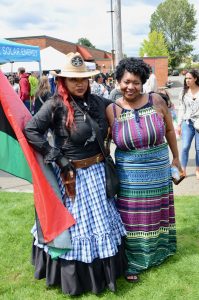
So, before partnering on events with the city, you were involved in radio. How did that come about?
I first came in contact with Media Island in about like 2014/2015. I had just gotten back from a study abroad project to France looking for connections with Afro French artists, and it was a part of my continuation of my thesis topic: How can African American women develop healthy psychosocial self-empowerment strategies? And one of those ways was to research our culture: music and dance culture. So, and also at the time, when I was a student, I was a radio station host on the [Evergreen] college campus radio station, KAOS. And so there was a hip hop activist in town, and he needed to have a place to be hosted from and so some folks had said, “Hey, what about Media Island International”? So we came here, and that was my first contact. And they had a small radio station here as well.
And so it was, you know, time had passed, and then they were having some immediate leadership issue. At the time, their members had realized I had vision skills and asked me to be a radio station manager. Then I was asked to become a board member. And I was also asked to to be a main mediation between the group and their leadership that was having some challenges there.
So, I was reluctant at first, because I wanted to see how it was going to work out. I didn’t want to be stepping into anything too traumatic, that I couldn’t handle. And so over time, you know, I went ahead and was checking them out. And they interviewed me. And then I went ahead and decided, you know, okay, I’ll go ahead and be on the board.
This is where you started bridging the different realms in your life.
It’s relationship building. I will say, number one…It happened over time. I started developing a relationship with the city in 2016, when I was still, you know, the returning student at Evergreen. And I brought out a speaker, Dr. Joy DeGruy Leary, author of Post Traumatic Slave Syndrome. And so portions of the city was doing a youth program, and we connected by the way we have that way.
So over the years in this thing, the following year, I was like, “Hey, you want to partner with me to bring out Rosa Clemente, who is an Afro Puerto Rican activist?” And they were like, ‘yeah, yeah, you know, let’s give it a shot,” because I had been doing some other work with them and stuff. So I think the second point is it does take time to relationship build. And having the ability to do that too. And the patience, and I’m pretty patient, because I’m not 20 right? And I’ve learned patience when I was, you know, a preschool teacher, a parent of three children myself, two of them are twins. So that helps. But you know, if you have longevity, and you know that things take time, and you’re working overtime, that’s the folks who have that quality of wanting to develop those relationships over time.
So you were connecting academics with city events.
Yes, and the third year, it was more like the city was like, “Oh, we see this over time, we see the investment, the importance of it.”
So I proposed, “Hey, how about we bring out Tim Wise, he’s an anti-racist activist, a white man. I thought that was really good visuals-we’re in a predominantly white town. So I know that people tend to listen to folks many times, especially white folks who look like them. And he came out and he did two successful, you know, speech talks and whatnot, Q and A’s. And that was really another success. And so after that, it was like, I want to build on the momentum. Olympia is a beautiful visual community. And it felt really good. And I was like, I’m investing in here. And when I tend to be in a place, I tend to want to make positive change. I want to make it safe and good as much as I can for myself and for others, especially women and children. And youth in general, you know, so I proposed last year, “Hey, why don’t we do a you know, Juneteenth event.” And they were like, “Let’s talk.” And so I already had a track record of some successful events built over time.
And the Olympia Juneteenth Celebration was born.
African Americans have a unique story that’s different from you know, Africans in the continent that’s different from the Caribbean, that’s different from immigrants that come over. And so, yeah, being able to tell those stories is important.
———————————
For those in the Olympia area, Buffalo Soldiers, Fighting on Two Fronts will be screening on July 21st at the Capitol Theater at 7 pm, with a Q & A afterwards.
If you would like more information on Buffalo Soldiers, Fighting on Two Fronts, you can find it on their website.
Shawna invites everyone to discover the Women of Color in Leadership Movement (WLCM) podcast on iTunes. Catch the latest on their Facebook page.


